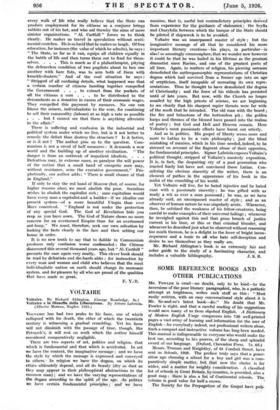VOLTAIRE
(Alberto Morano, Naples'. 1925.)
VOLTAIRE has had two peaks to his fame, one of which collapsed with his death, the other of which the twentieth century is witnessing a gradual crumbling. Yet his fame will not diminish with the passage of time, though, like Tetrarch's, it will rest on work which the author. himself
considered comparatively negligible. -
There are two aspects of art, polities and religion, that which is fundamental and that which is accidental. In art we have the content, the imaginative message ; and. we have the style by which the message" is expresSed and conveyed to others. In religion we have - the dogma, on which its ethics ultimately depend, and all its beauty (dry as dust as they may appear in their. philosophical abstractions to the common man) ; and we have the varying representations of the dogma according - to -the -spirit of the age; (In -polities we have certain fimdainental principles; and we-. have maxims, that is, useful but contradictory principles derived from experiehce for the kti idalnee of statesmen:; the Scylla and Charybdis between which the barque of the State should be piloted if shipwreck is to be avoided. Voltaire was an unsurpassed master of style ; but the imaginative message of all that he considered his more important literary creations—his plays, in particular—is alas ! so amazingly commonplace, that we wonder now however it could be that he was hailed in his lifetime as the greatest dramatist since Racine, and one of the greatest poets of all time. Again, in matters of religion, his piercing sarcasm demolished the anthropomorphic representations of Christian dogma which had survived from a former age into an age of scepticism, itself incapable of recreating its own repre- sentations. Thus he thought to have demolished the dognia of Christianity ; and the force of his ridicule has persisted until of late years. But now, with the Church no longer assailed by the high priests of science, we are beginning to see clearly that his sharpest rapier thrusts were far wide of the mark that he intended. The old man with the beard ; the fire and brimstone of the bottomless pit ; the golden harps and thrones of the blessed have passed into the realms of poetry ; but God and Hell and Heaven remain. Here Voltaire's most passionate efforts have burnt out utterly.
. And so in politics. His gospel of liberty seems more and more to Latins to be a vain philosophy ; just the blind mistaking of maxims, which in his time needed, indeed, to be stressed on account of the flagrant abuse of their opposites, for fundamental principles. Signor Labriola exposes Voltaire's political thought, stripped of Voltaire's masterly exposition. It is, in fact, the despairing cry of a past generation who reacted finely but have not convinced those Latins. Con- sidering the obvious sincerity of , the writer, there is an element of pathos in the appearance of his book in the midst of the crumbling of his world. Yet Voltaire will live, for he hated injustice and he hated cant with a passionate sincerity ; he was gifted with as ready a wit as ever a man possessed ; he was, as we have already said, an unsurpassed master of style ; and as an observer of human nature he was singularly acute. Whenever, then, he satirized the weakness of his fellow-creatures, being careful to make examples of their universal failings ; whenever he inveighed against this and that gross breach of justice current in his time, or this or that criminal blunder, and whenever he described just what he observed without reasoning too much thereon, he is a delight to the lover of bright incon- sequences and a tonic to all who hate self-deception and desire to see themselves as they really are. Mr. Richard Aldington's book is an extremely fair and sober guide to the study of a fascinating character, and










































 Previous page
Previous page